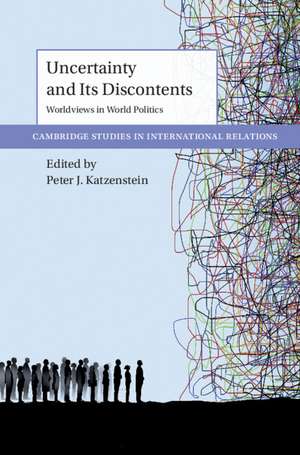Uncertainty and Its Discontents: Worldviews in World Politics: Cambridge Studies in International Relations
Editat de Peter J. Katzensteinen Limba Engleză Paperback – 6 iul 2022
| Toate formatele și edițiile | Preț | Express |
|---|---|---|
| Paperback (1) | 241.77 lei 6-8 săpt. | |
| Cambridge University Press – 6 iul 2022 | 241.77 lei 6-8 săpt. | |
| Hardback (1) | 616.99 lei 6-8 săpt. | |
| Cambridge University Press – 6 iul 2022 | 616.99 lei 6-8 săpt. |
Din seria Cambridge Studies in International Relations
-
 Preț: 200.78 lei
Preț: 200.78 lei -
 Preț: 190.01 lei
Preț: 190.01 lei -
 Preț: 198.89 lei
Preț: 198.89 lei -
 Preț: 210.69 lei
Preț: 210.69 lei -
 Preț: 200.85 lei
Preț: 200.85 lei -
 Preț: 232.37 lei
Preț: 232.37 lei -
 Preț: 237.58 lei
Preț: 237.58 lei - 8%
 Preț: 401.23 lei
Preț: 401.23 lei -
 Preț: 229.56 lei
Preț: 229.56 lei -
 Preț: 265.70 lei
Preț: 265.70 lei -
 Preț: 200.08 lei
Preț: 200.08 lei -
 Preț: 207.81 lei
Preț: 207.81 lei -
 Preț: 158.77 lei
Preț: 158.77 lei -
 Preț: 162.49 lei
Preț: 162.49 lei -
 Preț: 231.47 lei
Preț: 231.47 lei - 11%
 Preț: 584.77 lei
Preț: 584.77 lei -
 Preț: 287.87 lei
Preț: 287.87 lei -
 Preț: 209.12 lei
Preț: 209.12 lei -
 Preț: 299.22 lei
Preț: 299.22 lei -
 Preț: 286.13 lei
Preț: 286.13 lei -
 Preț: 287.87 lei
Preț: 287.87 lei - 11%
 Preț: 641.67 lei
Preț: 641.67 lei - 11%
 Preț: 585.78 lei
Preț: 585.78 lei - 14%
 Preț: 843.23 lei
Preț: 843.23 lei -
 Preț: 303.80 lei
Preț: 303.80 lei -
 Preț: 284.78 lei
Preț: 284.78 lei -
 Preț: 279.76 lei
Preț: 279.76 lei -
 Preț: 285.75 lei
Preț: 285.75 lei -
 Preț: 324.24 lei
Preț: 324.24 lei -
 Preț: 290.16 lei
Preț: 290.16 lei -
 Preț: 291.69 lei
Preț: 291.69 lei -
 Preț: 392.52 lei
Preț: 392.52 lei -
 Preț: 315.99 lei
Preț: 315.99 lei
Preț: 241.77 lei
Nou
Puncte Express: 363
Preț estimativ în valută:
46.26€ • 48.30$ • 38.29£
46.26€ • 48.30$ • 38.29£
Carte tipărită la comandă
Livrare economică 04-18 aprilie
Preluare comenzi: 021 569.72.76
Specificații
ISBN-13: 9781009068970
ISBN-10: 1009068970
Pagini: 320
Dimensiuni: 152 x 228 x 21 mm
Greutate: 0.53 kg
Ediția:Nouă
Editura: Cambridge University Press
Colecția Cambridge University Press
Seria Cambridge Studies in International Relations
Locul publicării:Cambridge, United Kingdom
ISBN-10: 1009068970
Pagini: 320
Dimensiuni: 152 x 228 x 21 mm
Greutate: 0.53 kg
Ediția:Nouă
Editura: Cambridge University Press
Colecția Cambridge University Press
Seria Cambridge Studies in International Relations
Locul publicării:Cambridge, United Kingdom
Cuprins
Preface; 1. Worldviews in world politics Peter J. Katzenstein; Part I. Substantialism and Relationalism: 2. Political worldviews in international relations: the importance of ideologies and foreign policy traditions Mark L. Haas and Henry R. Nau; 3. Relationality, post-Newtonian international relations, and worldviews Milja Kurki; 4. The president as mascot: relations all the way down Jairus Victor Grove; 5. Jewish questions and Jewish worldviews Michael Barnett; Part II. Accountable Agents and Epistemic Engines: 6. Weberian and relationalist worldviews: what is at stake? Henry R. Nau; 7. Oceans, jungles, and gardens: world politics and the planet Prasenjit Duara; Part III. Science and Religion: 8. Scientific worldviews in world politics: rationalization and the cosmological inheritance of the social sciences Bentley B. Allan; 9. Religious worldviews in global politics Timothy A. Byrnes; Part IV. Conclusion: 10. Of gardens, forests, and parks Peter J. Katzenstein; Index.
Recenzii
'As a most enlightening study on worldviews in world politics, this book explores the post-Newtonian multiverse full of uncertainties, potentialities and possibilities, challenging IR students to open up the Newtonian universe of the discipline where the rational belief in determinacy, control and causality dominates.' Yaqing Qin, Shandong University and China Foreign Affairs University
'Uncertainty and Its Discontents: Worldviews in World Politics is the best book on worldviews since Max Weber's Economy and Society. In it, Katzenstein and collaborators explore the argument that the reason why IR scholars have so much difficulty integrating uncertainty into their scientific theories is their adherence to a mechanistic Newtonian scientific worldview, which natural scientists moved away from during the last century and instead adopted a post-Newtonian quantum/relationist scientific worldview. Although Katzenstein finally settled for a middle ground between both worldviews, and not all his collaborators agree that IR should make a sweeping turn in scientific worldviews, one day, perhaps soon, the book may be recognized as having played a role in starting a shift in how IR scholars do science. It should be read, therefore, not only by sympathizers to Katzenstein's views but particularly by scholars who still live in a mechanistic and predictable world of risk.' Emanuel Adler, University of Toronto
'Uncertainty and Its Discontents: Worldviews in World Politics is the best book on worldviews since Max Weber's Economy and Society. In it, Katzenstein and collaborators explore the argument that the reason why IR scholars have so much difficulty integrating uncertainty into their scientific theories is their adherence to a mechanistic Newtonian scientific worldview, which natural scientists moved away from during the last century and instead adopted a post-Newtonian quantum/relationist scientific worldview. Although Katzenstein finally settled for a middle ground between both worldviews, and not all his collaborators agree that IR should make a sweeping turn in scientific worldviews, one day, perhaps soon, the book may be recognized as having played a role in starting a shift in how IR scholars do science. It should be read, therefore, not only by sympathizers to Katzenstein's views but particularly by scholars who still live in a mechanistic and predictable world of risk.' Emanuel Adler, University of Toronto
Descriere
This volume considers worldviews as foundational concepts for world politics.
